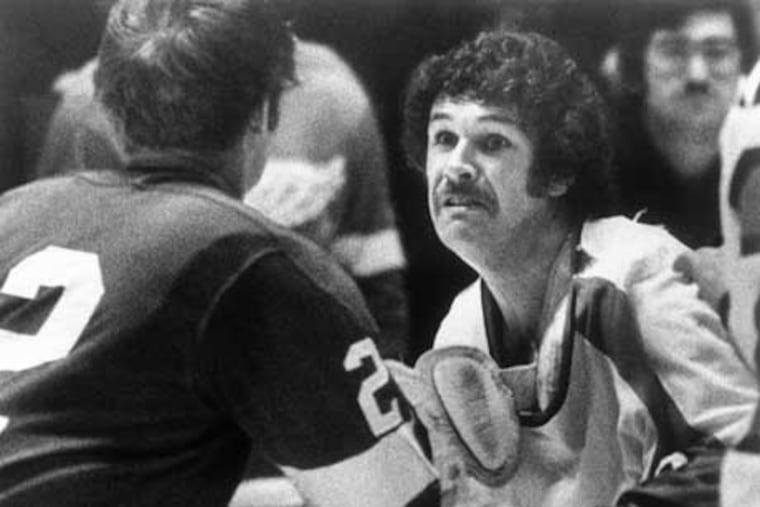Flyers playoff flashback: Dave Schultz’s famous fight helped propel team into its first Stanley Cup Final
The Flyers winger downplayed the importance of his fight in Game 7 in the 1974 Stanley Cup semifinals, but coach Fred Shero called it the turning point in his team's 4-3 win over the Rangers. It was the first time an expansion team had ever defeated an Original Six squad in a playoff series.

Seventh in a series counting down the 10 most memorable playoff wins in the Flyers’ history. Today: No. 4.
Flyers left winger Dave Schultz, the NHL’s bad boy in the 1970s, usually didn’t pop off in the press. Instead, he did his talking on the ice, with his fists.
There were a few exceptions, and one of them came as the Flyers were waiting to face the winner between the Montreal Canadiens and the New York Rangers in the 1974 Stanley Cup playoffs.
“I hope we play New York next because they have a reputation for choking in the past,” he said at the time.
As the Blueshirts were winning their series with a Game 6 victory over the Canadiens, Rangers fans responded with enthusiastic chants of “We want Schultz!”
The Stanley Cup semifinal between the Flyers and Rangers came down to a Game 7 showdown at the Spectrum, and it was Schultz who found himself at center stage as he pummeled Dale Rolfe in front of the New York net. At the time, the game was scoreless in the first period.
Schultz went after Rolfe after he had pushed Orest Kindrachuk, who tried to take the puck from Rangers goalie Ed Giacomin.
The 6-foot-1, 195-pound Schultz got in 12 straight punches and, at one point, pulled Rolfe’s hair to keep his balance. By one count, he outpunched Rolfe, 17-2. Oddly, no teammates rushed to aid the 6-4, 210-pound Rolfe.
“The Rangers just watched, and I think that fight spelled the end of them,” said Lou Nolan, the Flyers’ public-address announcer then and now. “That wouldn’t have happened with our guys.”
“They didn’t want to get a third man in and get thrown out, and I don’t blame them,” Schultz said recently. “It’s Game 7.”
After the Flyers advanced to the Stanley Cup Final with a 4-3 victory, winning coach Fred Shero called Schultz’s bout the turning point.
“It took something out of them,” he said of the Rangers after the most famous fight in the Flyers’ history. “They didn’t do as much hitting after that.”
Schultz, 70, now an electrical-power salesman, downplayed the significance of the fight with Rolfe, saying it wasn’t premeditated and wasn’t done to ignite his team.
“We didn’t need any spark. It’s Game 7,” said Schultz, who scored 20 goals and led the NHL with 348 penalty minutes that season. “We had each won three games at home, and the fight just happened. When it’s Game 7, you don’t want to take any bad penalties, so you try to play disciplined.”
The Rangers were outhustled, outchecked, and outshot (46-15). They didn’t have the same drive as the upstart Flyers, who were in just their seventh year in the NHL.
The Flyers swarmed Giacomin all afternoon. With the game tied at 1-1, second-period goals by Kindrachuk and Gary Dornhoefer – both on rebounds – gave the Flyers a 3-1 cushion.
After Steve Vickers cut the lead to 3-2 midway through the third, Dornhoefer answered just 12 seconds later to restore the two-goal lead. That turned out to be the winner after Pete Stemkowski put home a rebound with 5 minutes, 26 seconds remaining.
The Flyers became the first team from the 1967 expansion to knock off an Original Six opponent in a playoff series.
“They won,” Giacomin said after the game, “because they were all over us all the time.”
Brad Park, the Rangers’ star defenseman, wasn’t as complimentary, telling reporters he was “fed up with the ---- they were pulling. I wanted to give it right back, but I decided that if I had to maim somebody to win the Stanley Cup, then it wasn’t worth it. I look around this locker room and I’m prouder to lose with these guys than I would be winning with another club.”
It was a thinly veiled shot at the Flyers’ physical and sometimes intimidating style of play.
“Anybody would maim somebody to win the Cup,” a laughing Schultz said. “I didn’t maim anybody. It was just a fight. I felt bad for Dale Rolfe. He wasn’t the kind of guy who would drop his gloves by any means. From my perspective, him and Kindrachuk were jostling each other and I skated over. Rolfe dropped his glove and I said, ‘I don’t know if I want to do this.’ “
Schultz cackled.
“Just kidding,” he added.
Rolfe was a “good player and one of their best defensemen,” Schultz said. “During that series, our assistant, Mike Nykoluk, said, ‘If you get a chance, hit Rolfe. He’s playing well for them.’ But that wasn’t on my mind in that game -- at least I don’t remember it being on my mind at the time.”